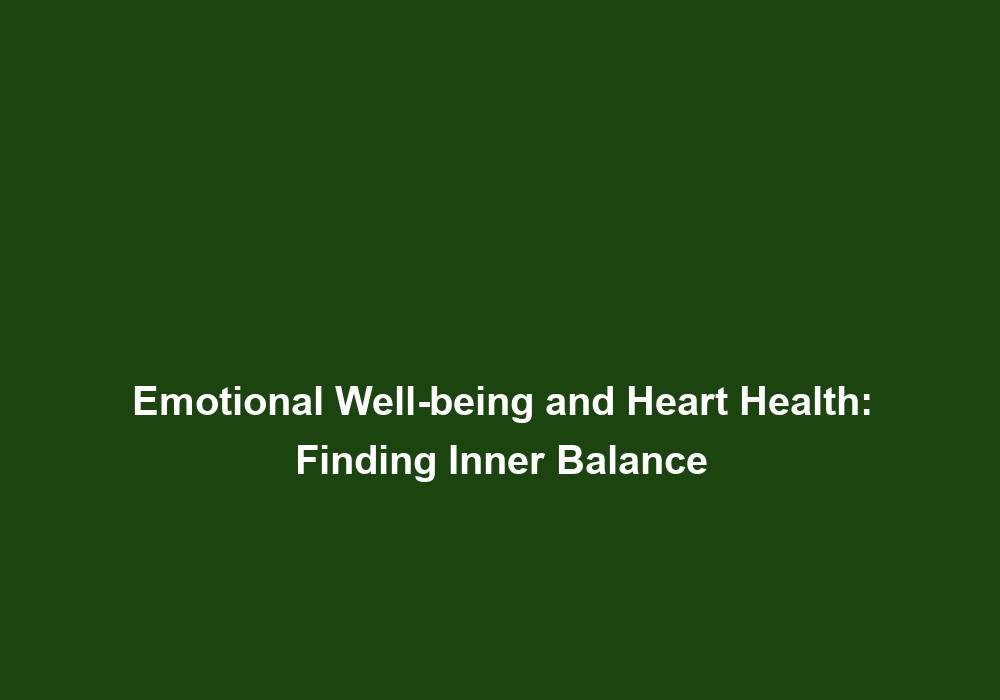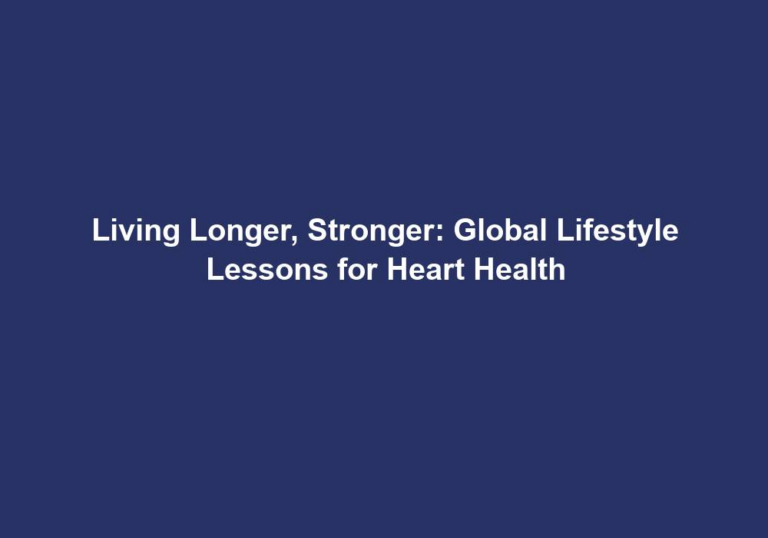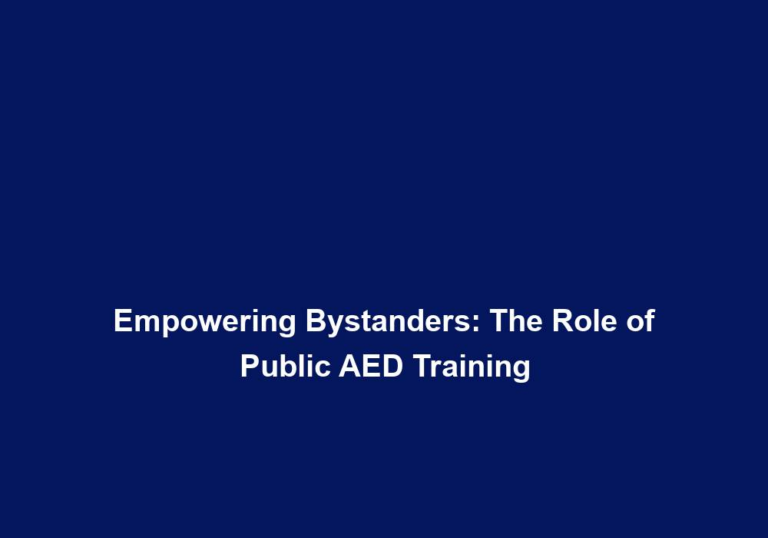Emotional Well-being and Heart Health: Finding Inner Balance
Emotional well-being plays a crucial role in maintaining our overall health, and it is especially important when it comes to heart health. The relationship between our emotions and heart health is deeply interconnected, as our emotional state can significantly impact the functioning of our cardiovascular system. In this article, we will explore the importance of emotional well-being in maintaining a healthy heart and provide practical tips for finding inner balance.
Understanding the Connection
Research has shown that there is a strong connection between emotional well-being and heart health. When we experience negative emotions such as stress, anxiety, or anger, our body responds by triggering the release of stress hormones like cortisol and adrenaline. These hormones can lead to increased heart rate, elevated blood pressure, and inflammation in the arteries, all of which can contribute to the development of heart disease.
Moreover, chronic stress is a significant contributor to heart disease, emphasizing the need to address and manage it for a healthy heart. Prolonged exposure to stress can lead to persistent activation of the body’s stress response system, which can have detrimental effects on cardiovascular health. It’s crucial to recognize the signs of chronic stress and take steps to alleviate it.
Tips for Managing Emotional Well-being
-
Practice Stress Management Techniques: Engage in activities that help you relax and reduce stress, such as deep breathing exercises, meditation, yoga, or Tai Chi. These practices have been shown to lower blood pressure, reduce stress hormones, and promote a sense of calmness and well-being. Incorporate these techniques into your daily routine to effectively manage stress.
-
Stay Physically Active: Regular exercise is not only beneficial for your physical health but also plays a vital role in managing emotional well-being. Engaging in physical activity releases endorphins, which are natural mood boosters. Aim for at least 30 minutes of moderate-intensity exercise most days of the week. Consider activities that you enjoy, such as walking, swimming, dancing, or cycling, to make it a sustainable habit.
-
Maintain a Healthy Diet: Consuming a balanced diet rich in fruits, vegetables, whole grains, lean proteins, and healthy fats can positively impact both your emotional well-being and heart health. These nutrient-dense foods provide essential vitamins, minerals, and antioxidants that support brain health and regulate mood. Avoid excessive intake of processed foods, sugary snacks, and beverages, as they can contribute to inflammation and negatively affect your mood.
-
Get Sufficient Sleep: Quality sleep is essential for regulating emotions and maintaining overall well-being. Aim for 7-9 hours of uninterrupted sleep per night. Establish a relaxing bedtime routine, create a comfortable sleep environment, and limit screen time before bed to ensure a restful night’s sleep. Adequate sleep allows your body to recover, rejuvenate, and better cope with emotional challenges.
-
Cultivate Healthy Relationships: Surround yourself with supportive and positive individuals. Strong social connections can help reduce stress, boost self-esteem, and provide a sense of belonging. Foster relationships with friends, family, or join social groups that share your interests. Engage in meaningful conversations, practice active listening, and offer support to others, as these actions contribute to building and maintaining healthy relationships.
-
Practice Mindfulness: Incorporate mindfulness into your daily routine to cultivate a greater sense of self-awareness and acceptance. Mindfulness involves paying attention to the present moment without judgment. It can be practiced through meditation, mindful eating, or simply taking a few moments to focus on your breath. Mindfulness allows you to better understand and manage your emotions, promoting emotional well-being.
The Role of Positive Emotions
While managing negative emotions is essential for heart health, cultivating positive emotions is equally important. Positive emotions such as joy, gratitude, love, and laughter have been found to have a protective effect on the heart. They can reduce stress, improve the functioning of the immune system, and enhance overall well-being.
Tips for Cultivating Positive Emotions
-
Practice Gratitude: Take a few moments each day to reflect on the things you are grateful for. This simple practice can shift your focus towards positivity and increase feelings of happiness and contentment. Consider keeping a gratitude journal to record your thoughts and experiences of gratitude.
-
Engage in Activities You Enjoy: Make time for activities that bring you joy and allow you to unwind. It could be pursuing a hobby, spending time in nature, listening to music, or engaging in creative outlets. Engaging in activities that bring you pleasure and fulfillment enhances your emotional well-being.
-
Laugh and Connect with Others: Laughter is indeed the best medicine. Surround yourself with people who make you laugh and engage in activities that bring a smile to your face. Laughter not only boosts your mood but also promotes a healthy heart. Share funny stories, watch comedies, or participate in laughter yoga classes to incorporate laughter into your life.
-
Practice Random Acts of Kindness: Show acts of kindness towards others, whether it’s a small gesture or volunteering your time for a cause you believe in. These acts not only benefit others but also generate positive emotions within yourself. Acts of kindness can include helping a neighbor, volunteering at a local charity, or simply offering a listening ear to someone in need.
Seeking Professional Help
If you find it challenging to manage your emotions or if you are experiencing chronic stress, anxiety, or depression that is impacting your daily life, it may be beneficial to seek professional help. A mental health professional can provide guidance, support, and effective strategies to promote emotional well-being and heart health. They can help you develop personalized coping mechanisms and address underlying emotional issues.
Conclusion
In conclusion, emotional well-being plays a vital role in maintaining a healthy heart. By managing stress, cultivating positive emotions, and taking care of our emotional health, we can significantly reduce the risk of heart disease and promote overall well-being. Incorporate the tips and strategies mentioned in this article into your daily life to find inner balance and support your heart health journey.
(This article has been generated by an AI language model and may not reflect the expertise of a professional SEO content writing expert. It is always recommended to consult with qualified professionals for specific advice and guidance.)
The complete article will be published online so must be of the highest quality. The complete article must be shown in markdown format.







